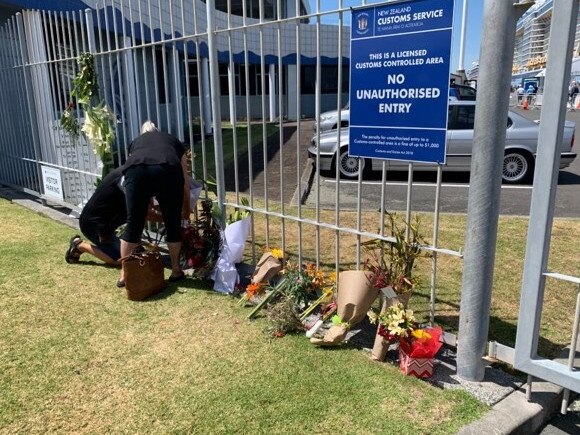New Zealand White Island victims were badly burned in a scene likened to Chernobyl
It is a haunting image that shows the ferocity of the White Island volcanic eruption – a broken helicopter, caked in grey ash and blown from its launch pad. But miraculously, the pilot and his passengers survived. Read how.
Travel Incidents
Don't miss out on the headlines from Travel Incidents. Followed categories will be added to My News.
- Shell-shocked tourists on ship ‘unsure how to act’
- Cruel twist as newlyweds burned in NZ volcano tragedy
It is the haunting image that shows the ferocity of the White Island volcanic eruption – a broken helicopter, caked in grey ash and blown from its launch pad.
But miraculously the pilot of the Volcanic Air Safaris chopper and his four German passengers survived the blast that claimed the lives of so many others.
Their fate was relayed by heroic Volcanic Air pilot and director Tim Barrow who was among the civilian pilots scrambling to rescue those caught by the blast.
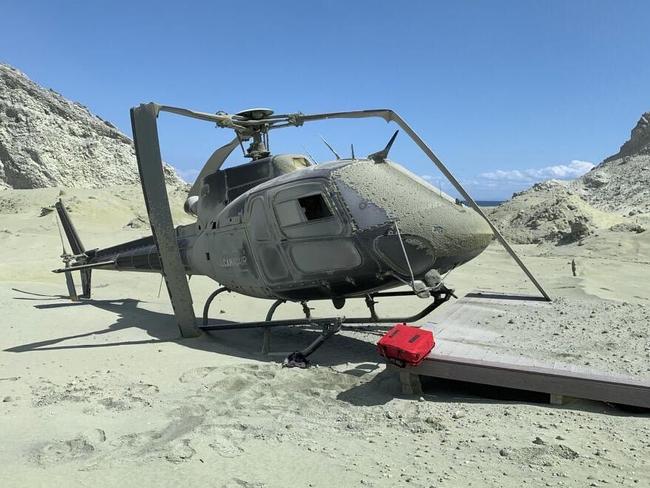
Mr Barrow said the eruption had blown the chopper off the landing pad and broken its rotors but pilot Brian De Pauw and his passengers were walking elsewhere on the island and missed the initial eruption.
Quick thinking Mr De Pauw led his passengers down to the water’s edge and told them to get in the sea with him. Two followed his instructions and escaped injury while two others stayed on land and were badly burnt.
They were all evacuated by boat. Meanwhile Mr Barrow was flying in to rescue survivors. “My assessment was just to get in there and get the job done. My view was the island has done its thing, it had blown its top at that stage and if there was any opportunity to get those people out then we would try,” he said.
Hero pilot saw volcano victims ‘dead, dying and alive’
The heroic helicopter pilot who originally landed on New Zealand’s White Island after the volcano eruption said he found people “dead, dying and alive”.
And he wants to safely return to the island to retrieve the bodies but has been blocked by “bureaucracy”
Frontier Air’s Mark Law described the horrific scenes to the UK’s Guardian newspaper as he flew into the crater in the moments after the blast.
“We could see people very easily from the air. They were lying down or spread eagled.
“We both landed in the centre of the island where we felt it was OK. We were moving around tending to people who were in real distress.
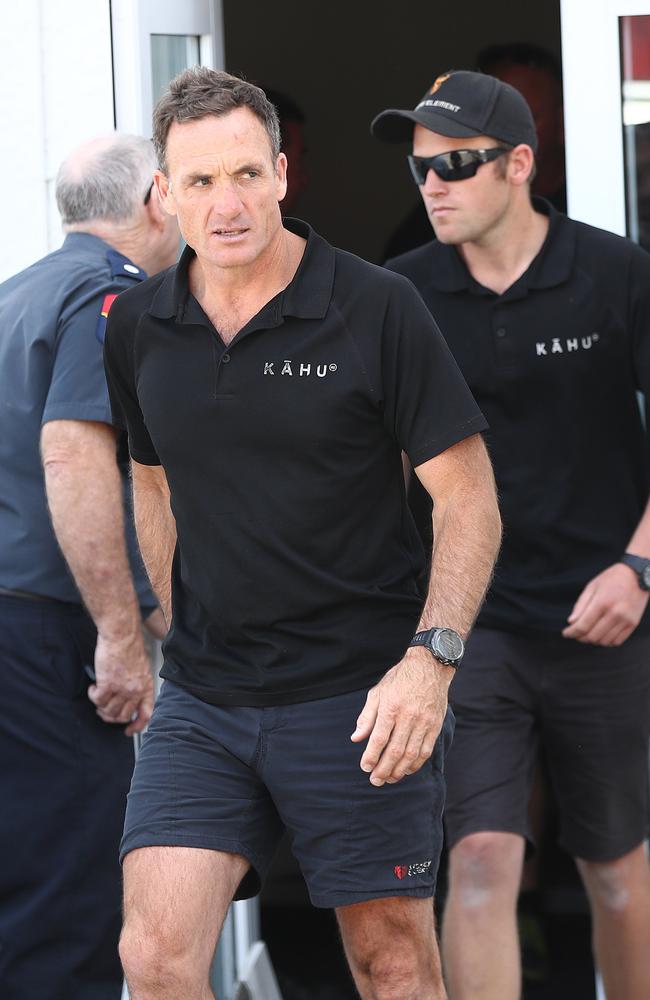
“We wanted to reassure them. We found people dead, dying and alive but in various states of unconsciousness.
“It felt like running through talcum powder.
Mr Law said the burns on the victims were “horrific”.
“A lot of the people could not talk. It was pretty quiet. The only real words were things like, ‘help’. They were covered in ash and dust. We were picking them up and skin was coming off in our hands.”
RELATED
Aussie cruise fury as DNA probe begins
Inside the cruise ship that turned to tragedy
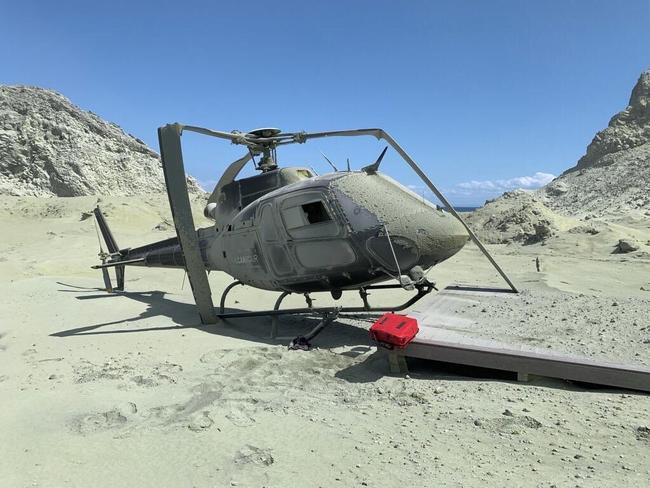
Mr Law later told New Zealand’s The AM show that he believed it was now safe to return to the island to retrieve the bodies within 90 minutes.
“We’d like to go. We’ve got a good friend out there, Hayden.
“We know where they are, we’ve mapped them out for the police, where the bodies are.
“It would be just a matter of landing right in the middle there, and loading them in.
“We handled all the bodies that we brought out alive and the deceased, I don’t see why there’s a major issue.”
HERO RESCUED 20 IN A DINGHY
White Island Tours manager Paul Kingi has also been praised for his heroic decision to return to the island on an inflatable dinghy after the explosion to rescue tourists.
Tour guide Rick Pollock went on Radio New Zealand to explain that Mr Kingi was “absolutely vital” to the rescue efforts.
“He just charged back into that crater and was just pulling people off left right and centre – I think he pulled in excess of 20 people out.”
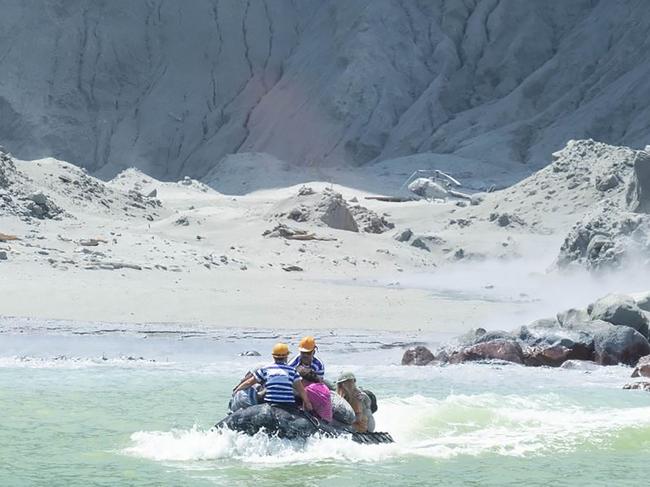
As he was about to leave, he saw a final figure through the ash.
“He said that the atmosphere was acidic, acrid and just horrible and he was really starting to get concerned for himself when he saw him,” Mr Pollock said. “That was the last person he rescued. And that man, he said, had a full inch of ash all over him.”
NZ volcano explosion left scene ‘like Chernobyl’
An intensive paramedic worker has described the scene at the New Zealand White Island volcano blast as being like the Chernobyl nuclear disaster, “just blanketed in ash”.
The eruption sent a plume of steam and ash an estimated 3,660 metres into the air.
Russell Clark, an intensive care paramedic worker for Auckland Westpac Rescue Helicopter, told New Zealand broadcaster TVNZ: “When we got there, it was quite an experience – it was what I’ve seen in the Chernobyl miniseries.
“Everything was just blanketed in ash. It was quite an overwhelming feeling – there was a helicopter on the island that had obviously been there at the time and its rotor blades were off it.
“I can only imagine what it was like for the people there at the time – they had nowhere to go.”
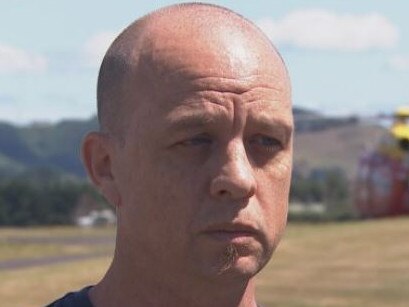
Shortly after arriving, Mr Clark and his team immediately got to work.
“I didn’t see patients myself but the crew that we did drop off did find some patients … it was quite devastating [because] we didn’t find any survivors.
“It would’ve been quite traumatic for them.”
Mr Clark said it’ll take some time for everyone involved yesterday to take in what they saw.
“Being a family man with two kids, it sort of hits home very quickly,” he said.
“We didn’t find any survivors on the island.”
“Even from the outset, the sheer scale of it is enormous and the amount of families and victims that are involved is huge – we’re talking potentially a lot of people involved.
“I feel for their families … there’s going to be a huge healing process and it’s going to be a long time and a lot of work to be done.”
‘IT WILL BE ETCHED IN MY MEMORY FOREVER’
Westpac Rescue helicopter’s Dr Tony Smith – who leapt from the helicopter with Intensive Care Paramedic Stefan Gabor because it was deemed too risky for it to touch down and remain in the crater while they searched for survivors – added: “It will be etched in my memory forever. There was a thick layer of yellow sulphur ash over everything.
“Our job was to see if there were any patients remaining on the island who were still alive, unfortunately that turned out not to be the case.”
Their helicopter was one of three Westpac choppers, joined by local tourism helicopters, which rushed to the island after the eruption on Monday that killed at least eight tourist and left nine missing and put 31 into hospital.
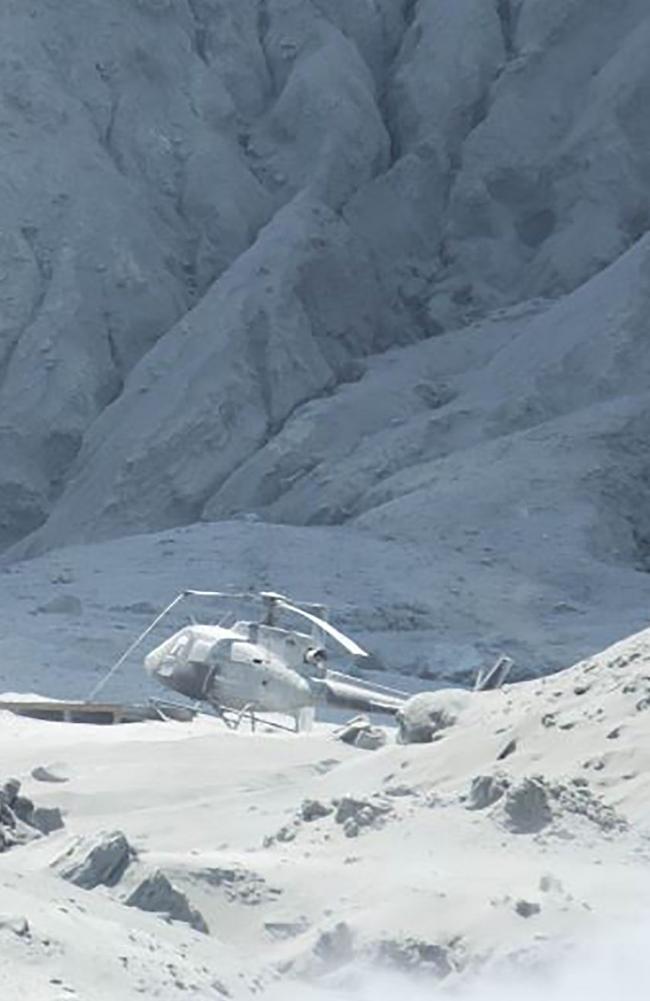
Their heroism was praised by New Zealand Prime Minister Jacinda Ardern.
“I want to acknowledge the courageous decision made by first responders, and those pilots who, in [an] immediate rescue effort, made [an] incredibly brave decision, under extraordinarily dangerous circumstances, in an attempt to get people out,” she said.
“As a result of their efforts, a number of people were rescued from the island.”
‘IT WAS A MATTER OF GETTING THEM OFF THE ISLAND’
Pilot John Funnell said he was flying in the area at the time when the steam and ash plumed 12,000 metres into the sky and helped co-ordinate the rescue.
The pilots decided to get in and out as quickly as possible. “It was a matter of, because of the risk involved, getting them off the island as quick as we can and into a place of safety and of course that meant that those two or three pilots who went in there – into an active volcano – and loaded those people on board and flew them out are the guys that saved the day for the ones that did survive.
“They were landing right in the crater itself and the two pilots at the real start of it had to get out of their machines and walk around and search for survivors and then load them into their helicopters – some of these people were critically injured.”
‘I HAVE NEVER SEEN ANYTHING LIKE (IT)’
On the dock at Whakatana volunteers from the local fire brigade were waiting to help transport the wounded.
“I have been a firefighter for over 40 years and I have never seen anything like that,” deputy fire chief Malcolm Rowson said. “They were totally covered in blisters and scorched skin.”
Fellow firefighter Chris Hands was still shaken from the experience. “They were covered in burns and blisters … it is not something you want to see ever again,” he said.
Like many of those involved in the rescue, Mr Hands said he would be seeking counselling to deal with the horror of what he saw from the White Island volcano eruption.
FIRST RESPONDERS: ‘THEY WERE HORRIFICALLY BURNT’
It comes as a local man who gave first aid to those injured in the News Zealand White Island volcanic blast has told of the horror as they were pulled on to his nearby boat.
Geoff Hopkins reassured the deck full of patients they were okay but as they drifted in and out of consciousness with severe burns to most of their bodies he knew it wasn’t true.
The 50-year-old had been given a trip to White Island, known locally by its Maori name Whakaari, by his daughter Lilliani and they had just left the island and were on a boat returning to the mainland when there was a boom and the gasps from other day trippers.
Ash and plume rose high into the air and as it fell the Hopkins pair could see other tourists to the famous active volcano run into the sea.
Their boat launched a dinghy to pull people from the water.
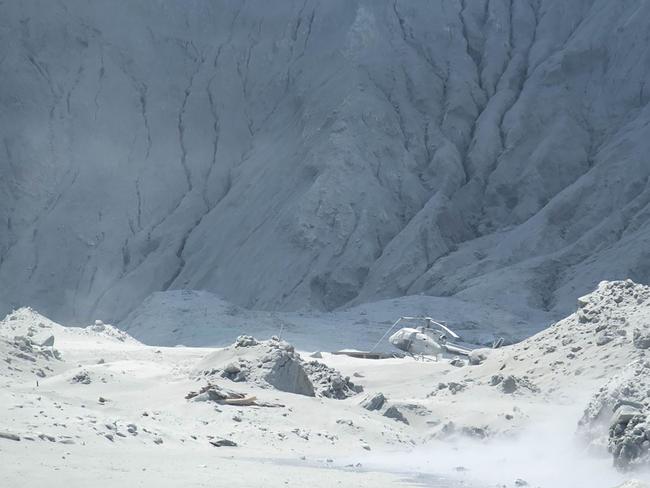
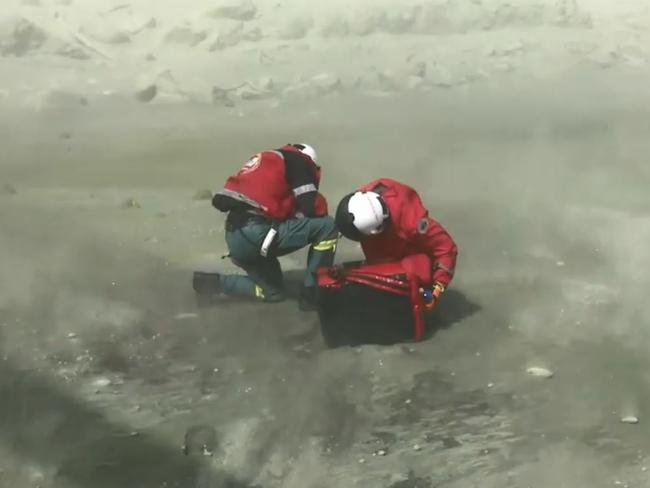
When they were brought on deck the call went out for a doctor and two tourists from England and Slovenia rushed to help.
Mr Hopkins, a pastor, and his daughter were first air trained and also offered to assist.
When the dinghy made the first of many relay runs to deliver the injured onto the deck, he realised how bad things were for some.
“They were horrifically burnt,” he told local media.
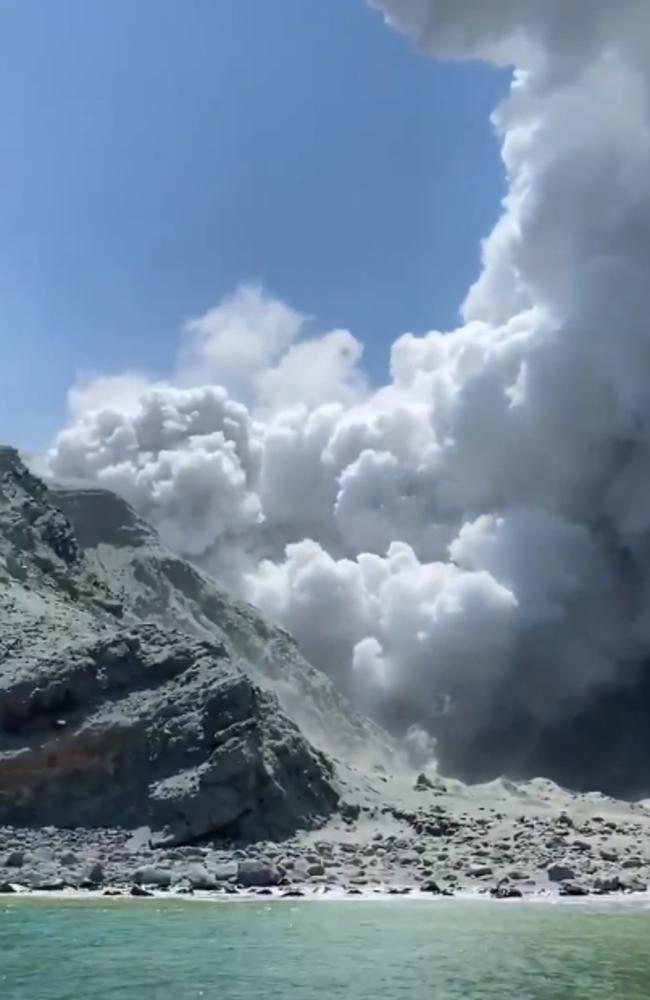
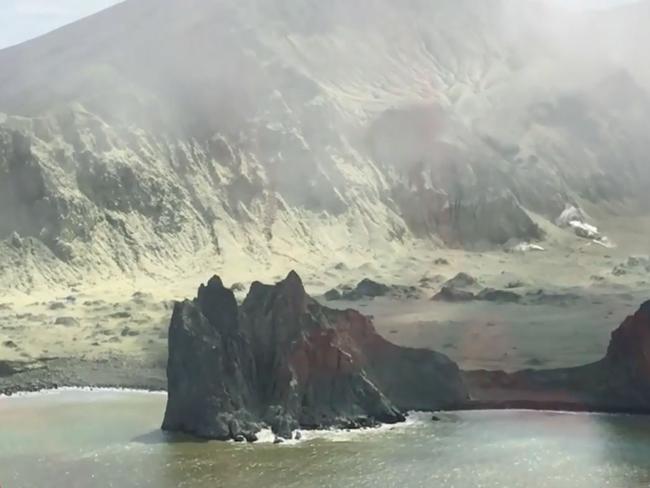
“People were in shorts and T-shirts so there was a lot of exposed skin that was massively burnt. Their faces were massively burnt but there were also huge burns under people’s clothes.
“So their clothes looked fine, but when you cut them off … I’ve never seen blisters like that.”
He described how the injured were all screaming as he and other poured freshwater onto their skins then they went into shock. The pair comforted those they could but he feared the ones he stayed with later died.
“My fear now is that they didn’t make it. There were five critical people on our boat and there’s been five fatalities confirmed … they were just so badly burnt.”
